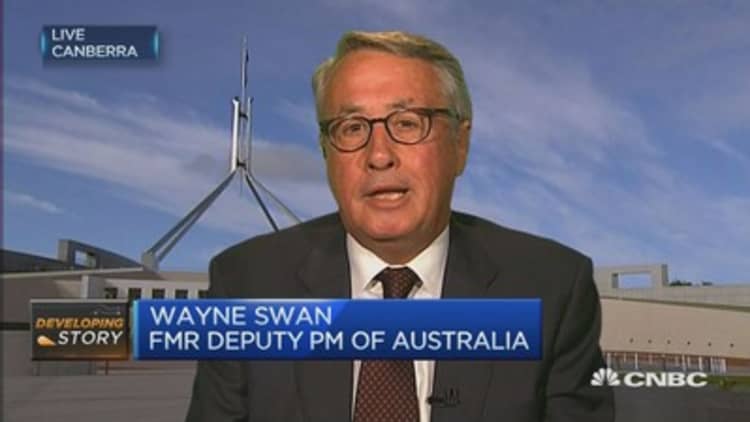While Australia's revolving door of prime ministers appears unsettling, having self-made millionaire-turned-politician Malcolm Turnbull at the helm could be a positive development for the country's troubled economy, say analysts.
Turnbull – who had been serving as the communications minister - was sworn in on Tuesday after defeating Tony Abbott in a dramatic leadership ballot a day earlier, becoming the country's fifth prime minister in eight years.
"The change in leadership has the potential to help Australia," said Shane Oliver, head of investment strategy and chief economist at AMP Capital. A man of many trades, Turnbull, a sixty-year-old Sydneysider, worked as a journalist, barrister, businessman and banker prior to launching a full-time career in politics.
First off, Turnbull is a more popular leader in Australia, particularly amongst Labor and swinging voters, said Oliver. "As a result we are likely to see a short term boost in economic confidence," he said.
Ousted Abbott had been struggling with a falling approval rating for more than a year owing to a combination of factors, including a harsh budget in 2014 and a slew of unpopular policies such as the roll-back of climate change legislation and his opposition to same-sex marriage.

Secondly, Turnbull is expected to be a more effective cross-party negotiator than his predecessor, which will result in more economic reforms getting passed through parliament, Oliver added.
Following his victory late Monday, Turnbull pledged a "thoroughly liberal government" promoting freedom of "individuals and markets" and promised to consult and explain policy changes.
"He is likely to focus more on articulating the challenges Australia faces, proposing reforms to address them and then reaching out to independents and political opponents in parliament to offer compromises to help ensure that they are passed into law," Oliver said.
"This is likely to include getting the budget back under control, reforming Australia's tax system, reducing bureaucracy. The commitment to free market economic policies, including free trade deals, is likely to remain," he added.
Read MoreAustralia to get new PM as Abbott loses out to rival Turnbull
Tim Toohey and Andrew Boak, economists at Goldman Sachs, said that while there are a number of uncertainties that will need to be resolved in coming days, they expected the business community to view Turnbull as more business friendly than his predecessor.
"Should the change in leadership result in a tangible lift in consumer and business confidence or a material shift in the nature of fiscal stimulus, there may well be significant implications for monetary policy direction," said Toohey and Boak in a note on Tuesday.
But filips in confidence due to change in leadership would prove transitory without a sustained improvement in the underlying economy, they cautioned.
Australia's economy faces stiff headwinds, ranging from a slowdown in China to a downturn in mining investment, suggesting its run as the economically 'lucky country' could be ending. Quarterly economic growth fell to a two-year low at 0.2 percent during the April-June period, slowing from 0.9 percent in the previous quarter, fueling predictions Australia may soon experience its first recession in more than two decades.
"In this respect the Prime Minister-elect is closer to the end in the decline in the terms of trade and hence the erosion of the government's taxation base, and is inheriting a much lower exchange rate and record low interest rates," the Goldman economists said.


